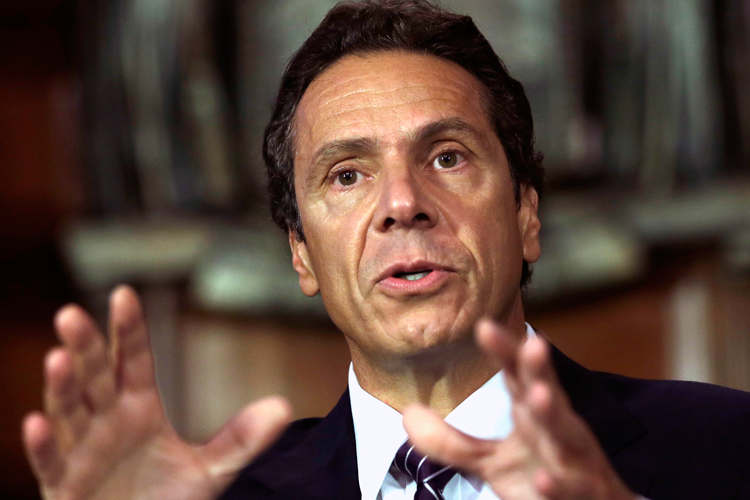Last week, New York and New Jersey imposed a 21-day mandatory quarantine on healthcare workers who have been in direct contact with Ebola patients, a move that has been heavily criticized by medical experts and the White House. “The President underscored that the steps we take must be guided by the best medical science,” according to a White House statement on the mandatory quarantine. “He also emphasized that these measures must recognize that health care workers are an indispensable element of our effort … and should be crafted so as not to unnecessarily discourage those workers from serving.”
“We need those health care workers,” Dr. Anthony Fauci, director of the National Institute of Allergy and Infectious Diseases, said this weekend. “So we do not want to put them in a position where it makes it very uncomfortable for them to even volunteer to go.”
Instead of a mandatory quarantine, which medical experts say could have unintended consequences, the Centers for Disease Control recommend voluntary isolation for healthcare workers considered “high-risk” for Ebola — people who have had direct contact with bodily fluids, like a needle stick. This is based on what they know about the transmission of the disease — that it spreads through direct contact with bodily fluids, not casual contact — and a desire to maintain calm among the public. But Cuomo and Christie seem unmoved by requests to ease the restrictive quarantine.
This is, of course, a familiar pattern. Lawmakers ignoring medical and public health experts while crafting policies about medicine and public health is kind of a thing. And as we saw after New Jersey quarantined a nurse named Kaci Hickox, and as experts have warned about the consequences of targeting healthcare workers at a moment when their services are desperately needed, this kind of hubris comes at the expense of actual living people.
While following along with the news from Cuomo and Christie over the weekend, I couldn’t help but think of the other lawmakers and equally ill-informed policies that impact people’s ability to practice medicine and/or access care. Like the governors in New York and New Jersey, they aren’t listening to the experts who have been clear that these policies hurt patients and health outcomes, while dealing in a heady mix of fear and misinformation to push their agendas.
When it comes to abortion, conservative lawmakers in Texas are a clear example of this, but the trend of regulating abortion into virtual non-existence, forcing doctors to lie to patients and cutting people off from abortion care is a national trend. Listen to the experts calling out New York and New Jersey for ignoring medical best practice, and you will hear echoes of what’s been said to states defending these laws.
Last year, the American Congress of Obstetricians and Gynecologists issued a statement denouncing HB 2 in no uncertain terms:
While we can agree to disagree about abortion on ideological grounds, we must draw a hard line against insidious legislation that threatens women’s health like Texas HB2 (House Bill 2) and SB1 (Senate Bill 1). That’s why we’re speaking to the false and misleading underlying assumptions of this and other legislation like it: These bills are as much about interfering with the practice of medicine and the relationship a patient has with her physician as they are about restricting women’s access to abortion. The fact is that these bills will not help protect the health of any woman in Texas. Instead, these bills will harm women’s health in very clear ways.
While a national association of reproductive health physicians called out the law, Texas enlisted a fringe-y marriage therapist who authored a discredited study on abortion to coach court witnesses to defend it. It didn’t work out so well. “The level of input exerted by [marriage therapist Vincent] Rue undermines the appearance of objectivity and reliability of the experts’ opinions,” District Court Judge Lee Yeakel wrote in his decision striking down parts of the law. “Further, the court is dismayed by the considerable efforts the State took to obscure Rue’s level of involvement with the experts’ contributions.” In a previous ruling, Yeakel found that an admitting privileges requirement was “without a rational basis,” and blocked the provision. (Parts of the law are still being challenged.)
We saw the same kind of faux expertise at play in Tennessee, where lawmakers ignored the advice of addiction specialists and maternal health experts to implement the first law to criminalize women for their pregnancy outcomes if they use narcotics while pregnant. The American Medical Association, the American Academy of Pediatrics and the American College of Obstetricians and Gynecologists uniformly oppose laws that criminalize pregnant women, and have cautioned that such measures do not improve pregnancy outcomes and discourage women from seeking prenatal care or treatment for substance dependence because they are scared of being arrested, incarcerated and losing custody of their children.
But the law’s sponsor, Republican Rep. Terri Lynn Weaver, dismissed critiques of the law, telling Salon, “It’s kind of frustrating to me, a lot of these people, the medical associations in their plush offices — and I am going to be blunt — they are just thinking about the prenatal monies they are not going to get.”
As my colleague Blake Zeff noted at Capital New York this week, Cuomo’s battle against science and medical best practice could be cynical posturing to win the support of a frightened public. Likewise, lawmakers like Weaver seem to put more stock in appearing “tough” on neonatal abstinence syndrome than meaningfully addressing the (treatable) health issue through better access to care. And Texas lawmakers talk a good game about women’s health while pushing laws that have the exact opposite outcome.
The takeaway here is maddeningly simple — listen to public health experts when crafting policies about public health. And yet many conservative politicians are really, really bad at doing this. And often for really cynical reasons. And almost always at the terrible expense of people’s health.

